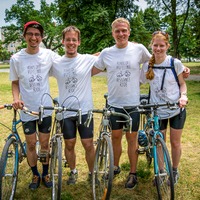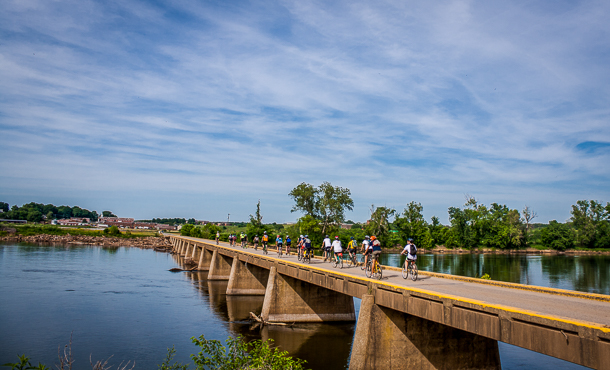After 300 miles, 10 days and several flat tires, a group of 30 college students, including four from Eastern Mennonite University (EMU), has crossed Virginia on bike, sparking dialogue and voicing concerns about the proposed Atlantic Coast Pipeline. The event, officially called the Atlantic Coast Pipeline Resistance Ride, was organized by the Virginia Student Environmental Coalition, a group committed to “growing a student environmental movement in Virginia.”
Jordan Luther ’15, Christopher Lehman ’15, Briana Nolt ’15 and rising senior Ryan Swartzentruber participated in the May 9–19 trek, which started in Augusta County and ended in Norfolk. Riders also came from James Madison University, University of Virginia, Virginia Commonwealth University, University of Mary Washington, Christopher Newport University and the College of William and Mary.
A controversial project

The 550-mile interstate natural gas pipeline is to be constructed by Dominion Resources, a Richmond-based energy company. The pipeline would start in North Carolina, span Virginia and end in West Virginia.
The bikers roughly followed a segment of the pipeline’s proposed route. Along the way, they met and spoke with landowners and community activists who have raised concerns about the pipeline.
Those against the pipeline argue that its construction would be a backward step in the nation’s endeavor to power itself with clean, renewable energy sources. They are also concerned about the possibility of gas leakage, which could endanger Virginia’s residents and wildlife. A recent study found that from July 2013 to November 2014, 372 oil and gas pipeline leaks, spills and other incidents led to 20 deaths, 117 injuries and more than $256 million in damages.
Proponents of the pipeline maintain that the pipeline would help the economy by creating jobs and providing access to reliable, low-cost natural gas. Virginia Governor Terry McAuliffe, a supporter, said the pipeline will allow Dominion to shut down old coal plants. “This is a lot less emissions,” said McAuliffe during a 2014 press conference unveiling the pipeline plan. “So what we’re doing…is great for the environment.”
Witnessing the human impact
EMU students first became aware of the resistance ride when Luther sent out an email to students in a bike maintenance class advertising the resistance ride as a fun way to participate in a bike tour and activism at the same time.
Swartzentruber decided to participate when he learned that the pipeline would run through some of his favorite mountain biking trails in George Washington National Forest. “I chose to do this ride to protect the mountains that have given me countless hours of joy,” he said.
Although Swartzentruber was initially skeptical as to whether the tour would be effective, the communities “met us with such gratitude and repeatedly told us how our actions rejuvenated their fight against this pipeline,” he said.

Nolt also was moved by the impact the ride had on people along the way. She “saw tears in people’s eyes as they welcomed us into their community.”
The cyclists arrived in Richmond on May 15 in time for Dominion Riverrock, an outdoor sports and music festival sponsored by the very company tasked with the construction of the pipeline. That night during a live performance, the bikers stood on a bridge above the stage holding cardboard letters adorned with Christmas lights that spelled “Dominion: No Pipeline.”
“As we held up our letters, I looked over the edge to see camera flashes twinkle throughout the crowd,” said Swartzentruber. “Hopefully our actions will at least spark some conversations.”
The students have gone their separate ways for the summer but with strong connections to those they met during the bike ride.
“I am excited about keeping the connections open with these schools, as it looks like more events will take shape in the near future,” said Nolt.
